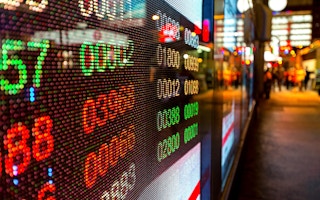Hong Kong-listed companies have improved slightly in their carbon disclosure rates but still fall far behind their international peers, a new study has found.
To continue reading, subscribe to Eco‑Business.
There's something for everyone. We offer a range of subscription plans.
- Access our stories and receive our Insights Weekly newsletter with the free EB Member plan.
- Unlock unlimited access to our content and archive with EB Circle.
- Publish your content with EB Premium.
The report, titled Carbon Matters: A Review of Listed Companies’ Carbon Disclosure and Performance in Hong Kong, found that the rate of carbon disclosure among 100 companies listed on the Hong Kong Stock Exchange (HKEx) grew from 15 per cent in 2011 to 19 per cent in 2013.
But this still pales in comparison to the 45 per cent carbon disclosure rate among companies globally.
Carbon disclosure refers to the reporting by a company of the amount of greenhouse gas emissions generated by its activities.
Published by Trucost on Monday on behalf of the British Consulate-General Hong Kong and funded by the UK Foreign and Commonwealth Office, the report was commissioned to provide a clearer picture of how firms are managing the risks and opportunities of climate change.
Global concerns on climate change have been rising in recent years and its effects - such as commodity price volatility, natural resource shortages and extreme weather events - threaten businesses, said Trucost, a UK-based consultancy which helps its clients measure and manage the environmental risks associated with their operations.
Trucost noted that investors want companies to be transparent on how they are managing these risks and progressing towards sustainable growth. The cost of carbon reporting is relatively insignificant and often outweighed by benefits such as savings from energy efficiency, said the firm.
According to its study, only two of the companies surveyed were able to publish an exact disclosure of its annual GHG data. Data from other companies required standardisation by Trucost to make it comparable.
Trucost said the aim of the study was to analyse the carbon disclosure and carbon management policies of the listed companies in view of the HKEx’s proposal to move from the current voluntary disclosure regime towards a stricter “comply or explain” approach by the end of the year.
In addition, Trucost analysed the carbon efficiency rates for each surveyed company to identify those which successfully decoupled economic growth with carbon emissions.
The study highlighted China Resources Power Holdings, a coal mining and power generation company, and Swire Properties, a property development firm, as promising “de-couplers” which were able to increase profits while reducing carbon emissions.
The 100 companies surveyed account for a total of 927 million tonnes of carbon dioxide emissions and represent 52 per cent of the market capitalisation of the HKEx.
The study also showed that as investors become increasingly concerned over the sustainability of their long-term investments, companies can provide for greater transparency through comprehensive carbon disclosure to its stakeholders as well as prospective investors.
Trucost’s head of business development in Asia, Chaoni Huang, said: “If companies and investors are to ensure future business growth, they need to develop low carbon, sustainable business models. Carbon disclosure is an essential first step that they must take to manage the risks and opportunities of climate change.”
The benefits of carbon reporting far outweigh the costs. According to the study, comprehensive disclosure of a company’s GHG emissions will not only enable the company to manage and tackle the environmental risks, it will also result in cost savings in the long-run, enhancements to the company’s reputation and brand, and strengthened stakeholder communication.
“
If companies and investors are to ensure future business growth, they need to develop low carbon, sustainable business models. Carbon disclosure is an essential first step that they must take to manage the risks and opportunities of climate change.
Chaoni Huang, Head of Business Development in Asia at Trucost
Stock exchanges also play a crucial role in developing the framework for carbon disclosure among listed companies.
The study showed that despite having one of the highest levels of market capitalisation in the world, the HKEx also has one of the lowest carbon disclosure rates.
This may mean that companies listed on the HKEx are more likely to contain hidden risks as well as opportunities. Stock markets in Shanghai, Tokyo and New York are in a similar predicament.
Moving forward: key recommendations
In its report, Trucost makes the following recommendations: listed companies should recognise both the tangible and intangible benefits of carbon reporting and work towards standards such as the GHG Protocol. The GHG Protocol is an international accounting tool used by governments and businesses to quantify and manage carbon emissions.
Investors should similarly be aware of the potential environmental risks when investing and request disclosure of the relevant information from companies.
Finally, Hong Kong’s regulators and stock exchange could actively support carbon reporting through sector-specific guidelines. The HKEx may also consider making carbon disclosures compulsory for listed companies - a move already made by many European countries, said the study.
”Climate change is creating global business challenges and putting company profits at risk,” stated Trucost in its study. “It is therefore important for companies to measure and manage their carbon emissions and associated risks and opportunities.”










